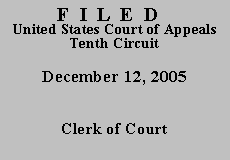

| FARAMARZ RAHAT,
vs.
HASKELL HIGGINS |
|
Mr. Rahat challenges his conviction, pursuant to a plea of nolo contendere, of injury to a minor child for which he was sentenced on October 29, 1979, to six years imprisonment. On October 31, 1979, Mr. Rahat sought to withdraw his plea, but the state trial court denied that motion on November 19, 1979. Despite being ordered to report to the sheriff within eight days of that denial in order to allow for execution of the judgment and sentence against him, Mr. Rahat failed to appear. Following Mr. Rahat's flight, the state trial court issued a bond forfeiture and bench warrant for Mr. Rahat's arrest. On February 3, 2003, a bench warrant was issued for Mr. Rahat's failure to surrender for execution of his sentence. See Doc. 4, Ex. 13a. Mr. Rahat was subsequently apprehended, and on April 1, 2003, was extradited from Missouri to Oklahoma.
Mr. Rahat filed an application for post conviction relief on April 22, 2003, which was denied by the state district court on June 2, 2003. Mr. Rahat filed an appeal, which was dismissed on July 16, 2003. On August 26, 2003 and March 5, 2004, Mr. Rahat filed motions for review and modification of his sentence. Both were denied. Next, Mr. Rahat filed an application for a writ of habeas corpus in the state trial court, but that was likewise denied. That denial was appealed to the Oklahoma Court of Criminal Appeals, where on July 14, 2004, Mr. Rahat was once again denied. On September 13, 2004, Mr. Rahat sought federal habeas review of his conviction. The district court denied relief on May 4, 2005. On August 8, 2005, it appears that Mr. Rahat was released from prison. Doc. Entry 9/22/2005 at http://www.oscn.net/applications/oscn/GetCaseInformation.asp?
number=CF-1979-409&db=Cleveland&submitted=true (accessed Nov. 28, 2005).
The district court adopted the report and recommendation of the magistrate judge, concluding that the ineffective assistance of trial, appellate, and post-conviction counsel should be considered time-barred and that the remaining contentions failed to state claims cognizable in federal habeas review. On appeal, Mr. Rahat advances three arguments raised below: (1) his trial, appellate, and post-conviction counsel were ineffective; (2) the state "lost jurisdiction" because there was no statutory authority to toll his original sentence for approximately 24 years, and that this "resentencing" violated his rights under the Fourth and Fourteenth Amendments; and (3) that the bench warrant upon which he was arrested was "illegal." Although Mr. Rahat also argues that limitations bars prosecution in October 2002 for an offense occurring in 1979, the 1979 state conviction is what matters here; later proceedings to execute that judgment cannot erase that fact. See R. Doc. 37 at 10.
Because the district court's dismissal of the ineffective assistance claims was based upon procedural grounds, Mr. Rahat must demonstrate that reasonable jurists would find it debatable whether the district court's procedural ruling was correct, and whether his habeas petition makes a "substantial showing of the denial of a constitutional right." Slack v. McDaniel, 529 U.S. 473, 484 (2000). On the remainder of the claims that were summarily dismissed, Mr. Rahat "must demonstrate that reasonable jurists would find the district court's assessment of the constitutional claims debatable or wrong." Id.
The Antiterrorism and Effective Death Penalty Act of 1996 ("AEDPA") added a one-year statute of limitations in habeas actions brought by state prisoners. 28 U.S.C. § 2244(d)(1). Because Mr. Rahat's final judgment, although never executed due to his flight from the jurisdiction, clearly occurred prior to AEDPA, the magistrate judge concluded that the statute of limitations began running on the effective date of AEDPA, i.e., April 24, 1996. Miller v. Marr, 141 F.3d 976, 978 (10th Cir. 1998). Even given this additional year-long grace period, Mr. Rahat clearly still filed his petition well beyond the April 24, 1997 deadline. United States v. Hurst, 322 F.3d 1256, 1260-61 (10th Cir. 2003). The magistrate judge then analyzed whether equitable tolling might apply in Mr. Rahat's case, but determined that in the absence of either a claim of actual innocence or an adequate showing of an impediment to his ability to bring his petition in federal court, Mr. Rahat had failed to raise an "extraordinary circumstance" meriting equitable relief. Id.
The district court's disposition of Mr. Rahat's claims is not reasonably debatable. As for Mr. Rahat's claim of ineffective assistance of counsel, his petition for federal habeas relief was not filed until September 13, 2004. Equitable tolling is inappropriate here, because the reason for the delay stems from Mr. Rahat's own flight as a fugitive from justice from the jurisdiction. Next, the district court's rejection of Mr. Rahat's claims that the state court "lost jurisdiction" over him and that the bench warrant issued for his arrest and extradition was "illegal" is not reasonably debatable. First, there is absolutely no authority for the proposition that a state's failure to actively seek a convicted felon who has fled the jurisdiction results in a "loss of jurisdiction" to execute the judgment and sentence. Second, despite Mr. Rahat's apparent argument to the contrary, a bench warrant issued to bring an individual before the court so that a previously imposed judgment can be executed simply does not implicate constitutional rights.
As such, we DENY Mr. Rahat's request for a COA and DISMISS his appeal.
Entered for the Court
Paul J. Kelly, Jr.
Circuit Judge